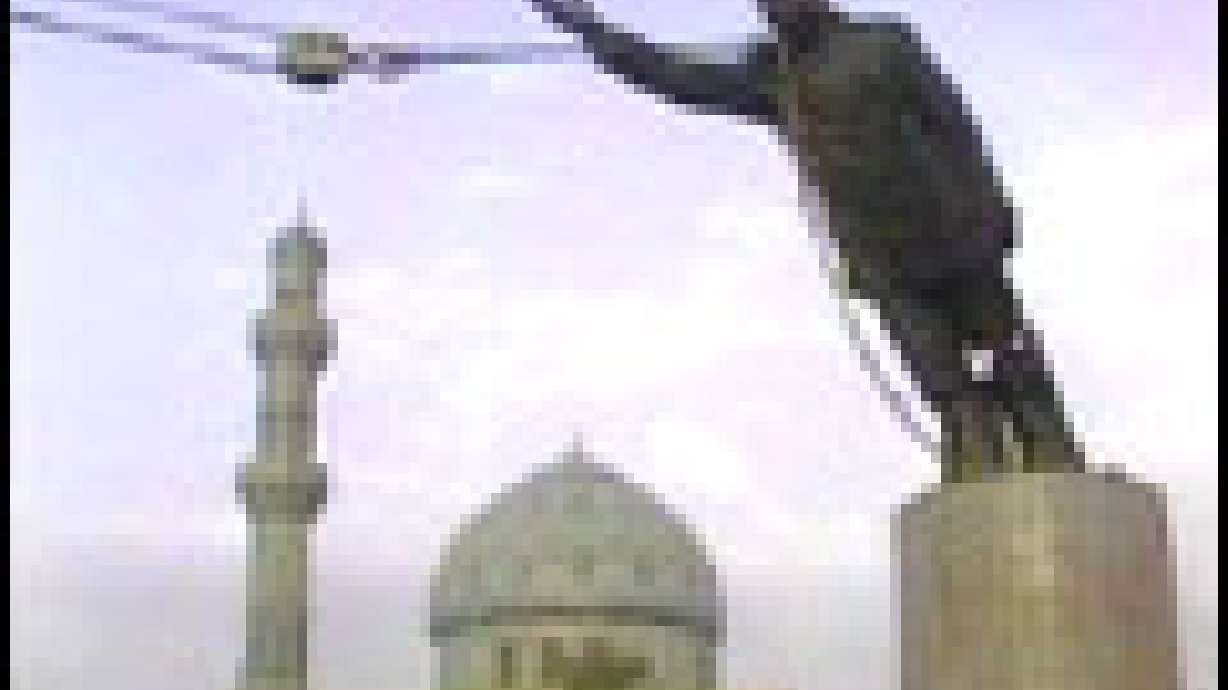Estimated read time: 4-5 minutes
This archived news story is available only for your personal, non-commercial use. Information in the story may be outdated or superseded by additional information. Reading or replaying the story in its archived form does not constitute a republication of the story.
CAIRO, Egypt (AP) -- Arabs responded Thursday to the sudden collapse of Saddam Hussein's government with anger, shock and even disbelief. One newspaper refused to acknowledge that Baghdad had fallen.
Across the Middle East, people struggled to reconcile images of celebrating Iraqis with widely held suspicions about the United States' motives.
"We discovered that all that the (Iraqi) information minister was saying was all lies," said Ali Hassan, a government employee in Cairo, Egypt.
"Now no one believes Al-Jazeera anymore," he said, referring to the Arabic-language television news channel.
The entire front page of the pan-Arab newspaper Asharq al-Awsat was devoted to a photograph of the pulling down Saddam's statue in Baghdad. Above it, the headline: "And Saddam's regime fell -- Shock in Arab capitals, joy in Baghdad, destruction of statues and the looting of official buildings."
Many Arabs -- even those who saw Saddam as an oppressive dictator -- had viewed the war as the struggle of an Arab underdog against foreign invaders interested in Iraqi oil. Most Egyptians, for instance, do not believe that Saddam had terrorist connections or weapons of mass destruction.
So the quick fall of Baghdad and Iraqi jubilation came as a shock. Many people resorted to conspiracy theories to explain the rapid collapse.
"There must have been treason," said Ahmed Salem Batmira, an Omani political analyst.
People across the Arab world clustered around TV sets in shop windows, coffee shops and homes to see the pictures of U.S. troops driving from one side of an Arab capital to the other, almost without resistance.
The Palestinian militant groups Hamas and Islamic Jihad decried Saddam's fall, while ordinary Palestinians expressed shock.
In the Gaza Strip, the Arab Liberation Front -- a pro-Saddam group that had distributed Iraqi money to Palestinian suicide bombers, gunmen and civilians killed in 30 months of fighting with Israel -- lowered its profile Thursday.
In the West Bank city of Nablus, Yousef Mizher, 32, said that at the beginning of the war, he distributed 300 photos of Saddam along with the Palestinian newspapers he delivers daily because "I loved this guy."
"But when I saw the defeat yesterday on TV, I realized how silly I had been. Saddam is just like any Arab leader. He wants to stay in power at the expense of the blood and bones of his people," Mizher said. Saddam, he added, should have gone into exile instead of sacrificing his people in a war with the Americans."
The Egyptian opposition newspaper Al Wafd refused to believe it. Its front page story said: "Iraqi and Arab fighters desperately try to defend Gomhuria Bridge that the invading armies are trying to use to reach the eastern bank of the Tigris and central Baghdad."
Nowhere did Al Wafd say that U.S. troops had overwhelmed central Baghdad.
Some painted Iraq's defeat as another Arab humiliation caused by U.S. military technology, and recalled the Middle East war of 1967 when Western-armed Israel thrashed numerically superior Arab armies.
Arabs are very much aware that the Apache helicopters and other weapons used in Iraq are the same ones that Israel is using against the Palestinians, Maher Othman, a senior editor of Al Hayat, said on British Broadcasting Corp. television.
Doubts persisted about the United States' intentions and Iraq's future. Mohammed al-Shahhal, a teacher in Tripoli, Lebanon, recalled the poverty and political turmoil in Russia following the collapse of the Soviet Union.
"Those who applauded the collapse of Lenin's statue for some Pepsi and hamburgers felt the hunger later on and regretted what they did," al-Shahhal said.
Some, however, said they hoped the fall of Saddam could signal a new move toward democracy in the Middle East.
"I don't like the idea of having the Americans here, but we asked for it," said Tannous Basil, a cardiologist in Sidon, Lebanon. "Why don't we see the Americans going to Finland, for example? They come here because our area is filled with dictatorships like Saddam's."
Bahraini physician Hassan Fakhro, 62, said he was saddened by the crumbling of the Iraqi resistance in Baghdad.
"Whatever I'm seeing is very painful because although Saddam Hussein was a dictator, he represented some kind of Arab national resistance to the foreign invaders -- the Americans and the British," he said.
(Copyright 2003 by The Associated Press. All Rights Reserved.)








